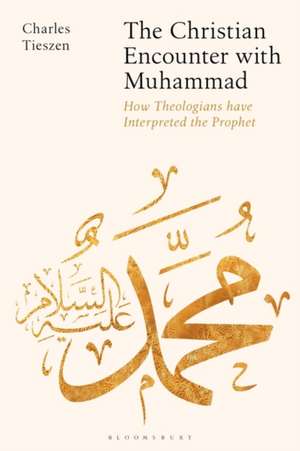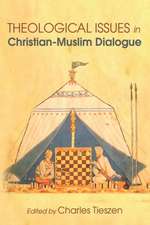The Christian Encounter with Muhammad: How Theologians have Interpreted the Prophet
Autor Charles Tieszenen Limba Engleză Paperback – 18 mai 2022
| Toate formatele și edițiile | Preț | Express |
|---|---|---|
| Paperback (1) | 197.52 lei 6-8 săpt. | |
| Bloomsbury Publishing – 18 mai 2022 | 197.52 lei 6-8 săpt. | |
| Hardback (1) | 598.02 lei 6-8 săpt. | |
| Bloomsbury Publishing – 11 noi 2020 | 598.02 lei 6-8 săpt. |
Preț: 197.52 lei
Preț vechi: 257.73 lei
-23% Nou
37.79€ • 39.57$ • 31.27£
Carte tipărită la comandă
Livrare economică 05-19 aprilie
Specificații
ISBN-10: 1350191256
Pagini: 232
Ilustrații: 10 bw illus
Dimensiuni: 156 x 234 mm
Greutate: 0.33 kg
Editura: Bloomsbury Publishing
Colecția Bloomsbury Academic
Locul publicării:London, United Kingdom
Caracteristici
Notă biografică
Charles Tieszen is SIS Adjunct Professor for Islamic studies and Christian-Muslim relations at Fuller Theological Seminary, USA. He is an editor for the project Christian-Muslim Relations: A Bibliographical History, and he has also most recently published Cross Veneration in the Medieval Islamic World (I.B. Tauris, 2017) and Theological Issues in Christian-Muslim Dialogue (2018) .
Cuprins
Introduction1. Muhammad as a Christian Catechumen: Sergius-Bahira and a Legendary Counter history2. Muhammad as a Prophet of Inferior Monotheism: John of Damascus and a New History of the World 3. Muhammad as a Retrograde Moses of Minimal Significance: East-Syrian Christians and Public Discussions with Muslims4. Muhammad as a Carnal Warrior and Scheming Ruler: West-Syrian Christians and Refutations of the Prophet5. Muhammad as an Anti-Saint: Martyr Saints and Hamartiography of the Prophet6. Muhammad as a Tainted Vessel of Christ: An Anonymous Counter-Chronicle of the Prophet7. Muhammad as a Vanquished Anti-Hero: A Convert, a Translator and Polemic Exposing the Prophet8. Muhammad as a Powerless Prophet to the Arabs: Paul of Antioch and Letters Written to Muslims9. Muhammad as a Prophet and Colonial Goad for Persecutors: Mary Fisher and a Notorious Encounter with a Sultan10. Muhammad as a Redundant Gabriel And Missionary Conscript: Samuel Ajayi Crowther and West African Mission to Muslims11. Muhammad as a Signpost for Fellow Pilgrims: Lamin Sanneh and Christian Appreciation for the Prophet's BiographyConclusionBibliographyIndex
Recenzii
Descriere
This book offers a fresh appraisal of Muhammad that considers the widest possible history of the ways in which Christians have assessed his prophethood.To medieval Christian communities, Muhammad-the leader of a religious and political community that grew quickly and with relative success-was an enigma. Did God really send him as a prophet with a revelation? Was the political success of the community he founded a divine validation? Or were he and his followers inspired by something evil? Despite their attempts, modern Christians continued to be puzzled by Muhammad. The Qur'an provided a framework for understanding and honouring Jesus; was it possible for Christians to reciprocate with regard to Muhammad?This book applies the same analysis to both medieval and modern assessments of Muhammad, in order to demonstrate the continuities and disparities present in literature from the two eras.

